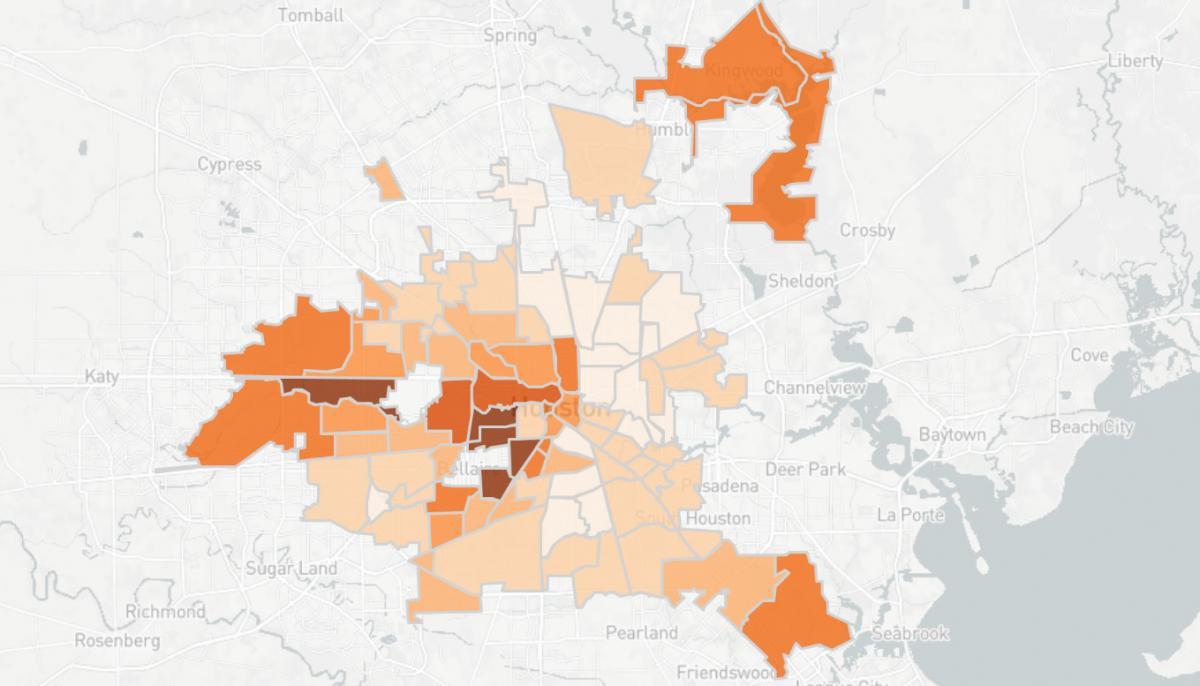New data dashboard offers Houstonians tool to measure city progress
A new website allows residents of Houston to quickly visualize progress across the city and in their neighborhoods on factors such as income inequality, graduation rates, access to transit, proximity of waste sites and more.
OCTOBER 29, 2019, HOUSTON—A new website allows residents of Houston to quickly visualize progress across the city and in their neighborhoods on factors such as income inequality, graduation rates, access to transit, proximity of waste sites and more.
Houston Sustainability Indicators gathers data from multiple statistical sources on a comprehensive range of issues to answer: “Is Houston becoming a more sustainable city?”
The data dashboard is a collaboration between Rice University, Houston Sustainability Indicators Program (Rice-HSi) and the International Institute for Sustainable Development, a global sustainability think tank. The site charts and maps key data points in 17 categories that together represent community well-being and align with the International Sustainable Development Goals or SDGs.

A growing number of American cities—including New York City, Pittsburgh, and Baltimore—are using the SDGs as a framework to measure progress, says Stefan Jungcurt, IISD Lead for SDG Indicators and Data. That shift prompted his team to develop an easy-to-replicate platform that turns local data into powerful, interactive visualizations.
“North American cities are looking for more affordable, modern ways to monitor local development and engage citizens,” says Jungcurt. “In our head office city of Winnipeg, the civil service is redesigning their main municipal planning document to include SDG indicators after viewing a similar dashboard, while poverty reduction groups are using the data to refine their priorities. I’m excited to see how this tool helps Houston’s leaders advocate for data-driven policy.”
Dr. David Abraham, Research Director for the Rice-HSi team and Treasurer for the Community Indicators Consortium (CIC) coalition says, “The City of Houston will celebrate its 200-year birthday in 2036. That is just six years after the 2030 mark that countries all over the world have set for achieving the SDG targets. Through our work, Houston will join countries and cities across the world in tracking sustainability progress and improving quality of life for its people.”
“Every year until 2030, our team will report on Houston’s progress towards the 2030 SDG targets,” says Abraham. “We’ll also be reaching out nationally to support other cities in tracking their SDG Targets.”
Houston Sustainability Indicators: us-houston.tracking-progress.org
For interviews or a media walkthrough of Houston Sustainability Indicators, contact:
Matthew TenBruggencate, Communications Officer, IISD, mtenbruggencate@iisd.org or 1-204-297-9779
David Abraham, Research Director, Rice-HSi, DAbraham@rice.edu or 713-348-1000
About Rice-HSI
The Houston Sustainability Indicators (HSI) program is a long-range effort to assist with the measurement and characterization of community sustainability and urban sustainability in Houston. Metrics for the chosen indicators were defined and are measured based on literature review; expert and advisory consultation; and data availability. The Houston Sustainability Indicators Program was funded by the Shell Center for Sustainability from 2010 - 2017. The Rice University, Sustainability Solutions Lab (Rice-SSL) group, currently manages the program.
About IISD
The International Institute for Sustainable Development (IISD) is an award-winning independent think tank working to accelerate solutions for a stable climate, sustainable resource management, and fair economies. Our work inspires better decisions and sparks meaningful action to help people and the planet thrive. We shine a light on what can be achieved when governments, businesses, non-profits, and communities come together. IISD’s staff of more than 250 experts come from across the globe and from many disciplines. With offices in Winnipeg, Geneva, Ottawa, and Toronto, our work affects lives in nearly 100 countries.
You might also be interested in
What Will Happen at COP 29?
Talks at the 2024 UN Climate Change Conference (COP 29) will range from defining a way forward on finance through a new collective quantified goal (NCQG) to mitigation, and loss and damage. Ahead of negotiations in Baku, IISD’s Earth Negotiations Bulletin Team Lead Jennifer Bansard examines the agenda and breaks down what to watch as eyes turn to Azerbaijan.
Why We Shouldn’t Give Up on the SDGs
The SDG framework may seem out of reach, but it’s the backbone of global cooperation.
Border Carbon Adjustment Mechanisms and Impacts on Vietnam
This report consolidates, analyzes, and presents views and perspectives of stakeholders from Vietnam on border carbon adjustment (BCA) schemes to contribute to the global debate on BCA good practices.
The United Kingdom's Strategy for Carbon Border Adjustment in a Changing Global Landscape
This report consolidates, analyzes, and presents views and perspectives of United Kingdom stakeholders on its proposed Carbon Border Adjustment Mechanism (CBAM) to contribute to the global debate on international principles and best practices for national border carbon adjustment schemes.